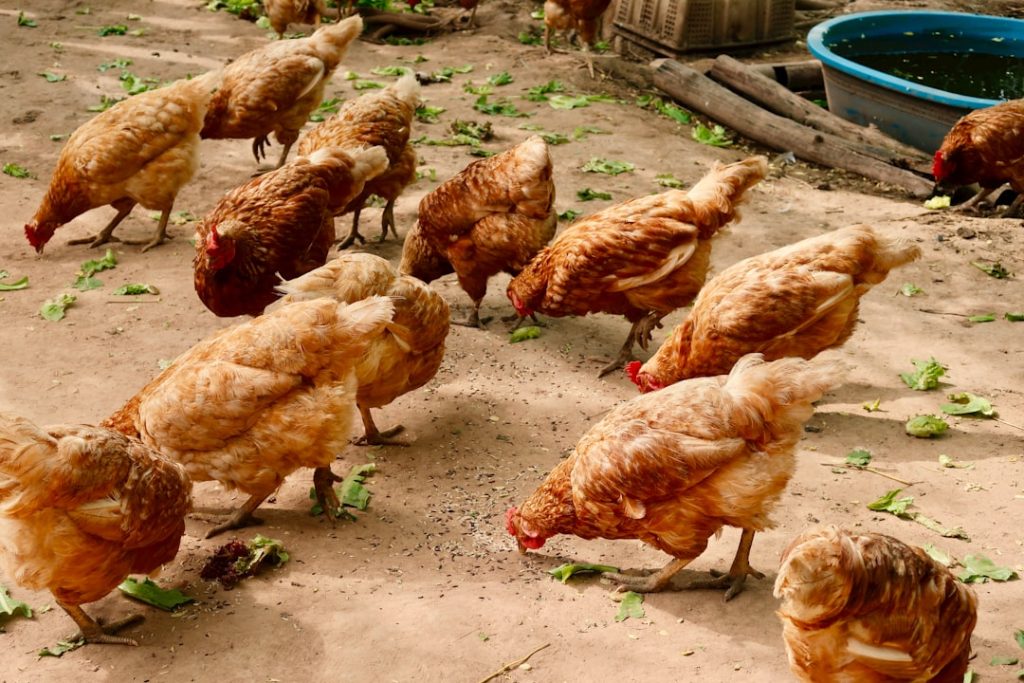Keeping chickens in your backyard has become a growing trend in recent years, as more and more people are discovering the benefits of having these feathered friends as part of their lives. Not only do backyard chickens provide a sustainable source of fresh eggs, but they also make great pets and can even help with fertilizing your garden. In this article, we will explore the various benefits of keeping chickens, as well as the important considerations and regulations that come with it.
Key Takeaways
- Keeping chickens has many benefits, including fresh eggs, natural pest control, and fertilizer for gardens.
- It is important to understand local laws and regulations regarding chicken keeping, including zoning laws and permits.
- Property size requirements vary by location, so it is important to research and comply with these regulations.
- Coop design and maintenance are crucial for the health and safety of chickens, as well as for preventing odors and attracting predators.
- Feeding and care of chickens require attention to their nutritional needs and daily routines, as well as protection from predators and weather conditions.
- Predators such as raccoons, foxes, and hawks can pose a threat to chickens, so it is important to implement security measures such as fencing and locking coops at night.
- In conclusion, keeping chickens can be a rewarding and sustainable hobby, but it requires careful consideration of local regulations and proper care and maintenance. Resources for further information include local extension offices and online forums for chicken enthusiasts.
Benefits of Keeping Chickens
One of the most obvious benefits of keeping chickens in your backyard is the availability of fresh eggs. There is nothing quite like collecting eggs from your own flock and enjoying them for breakfast. Not only are fresh eggs delicious, but they are also more nutritious than store-bought eggs. They contain higher levels of vitamins and minerals, as well as omega-3 fatty acids.
In addition to providing fresh eggs, chickens can also make wonderful pets. They are social animals that can be quite friendly and entertaining to watch. Many chicken owners find that their birds have unique personalities and enjoy spending time with them in the yard. Chickens can also be great for children, teaching them responsibility and providing a hands-on learning experience about where food comes from.
Another benefit of keeping chickens is the opportunity to use their manure as fertilizer for your garden. Chicken manure is rich in nutrients and can help improve soil quality and promote healthy plant growth. By composting the manure before using it in your garden, you can ensure that it is safe and effective.
Understanding Local Laws and Regulations
Before embarking on your backyard chicken adventure, it is crucial to understand the local laws and regulations regarding chicken keeping in your area. Each city or town may have its own set of rules that dictate how many chickens you can have, where they can be kept, and what kind of permits may be required.
Failure to comply with these regulations can result in fines or even the forced removal of your chickens. It is important to do your research and understand the rules before bringing chickens into your backyard.
There are several resources available for finding local laws and regulations. Your city or town’s website may have information on their ordinances regarding backyard chickens. You can also reach out to your local government office or animal control department for guidance. Additionally, there are online forums and communities where chicken keepers share information and experiences, which can be a valuable resource for understanding the regulations in your area.
Zoning Laws and Permits
Zoning laws play a significant role in determining whether you can keep chickens on your property. These laws dictate how land can be used within a specific area, and they often include regulations on keeping livestock or poultry.
Some areas may require you to obtain a permit before keeping chickens, while others may have specific zoning requirements that must be met. It is important to familiarize yourself with these laws and obtain any necessary permits before bringing chickens onto your property.
Resources for obtaining permits can vary depending on your location. Your local government office or animal control department should be able to provide information on the process and requirements for obtaining a permit. Additionally, there may be online resources or organizations dedicated to urban chicken keeping that can provide guidance.
Property Size Requirements
Property size requirements for keeping chickens can vary depending on where you live. Some areas may have minimum lot size requirements, while others may have restrictions based on the number of chickens per square foot.
It is important to understand these requirements and ensure that your property meets the necessary criteria before bringing chickens onto your land. Failure to comply with property size requirements can result in fines or other consequences.
Different types of chickens may also have different space requirements. For example, larger breeds may need more space than smaller breeds. It is important to consider the size and needs of the specific breeds you plan to keep when determining how many chickens your property can accommodate.
Calculating the number of chickens allowed on your property can be done by dividing the total square footage of your property by the required square footage per chicken. This will give you an estimate of how many chickens you can keep within the legal limits.
Coop Design and Maintenance

A well-designed coop is essential for the health and safety of your chickens. It should provide adequate space for them to move around, roost, and lay eggs. It should also have proper ventilation to prevent the buildup of moisture and ammonia.
There are several types of coops to choose from, including traditional wooden coops, mobile coops, and converted sheds or structures. Each type has its own pros and cons, so it is important to consider your specific needs and preferences when selecting a coop design.
Regular maintenance of the coop is also important to ensure the health and well-being of your chickens. This includes cleaning out bedding regularly, checking for signs of pests or disease, and providing fresh food and water daily. Coops should also be inspected for any potential hazards or structural issues that could pose a risk to the chickens.
Health and Safety Considerations
Keeping chickens comes with certain health risks that need to be considered. Chickens can carry diseases such as salmonella, avian influenza, and Newcastle disease, which can be transmitted to humans. It is important to practice good hygiene when handling chickens and their eggs, such as washing hands thoroughly after contact.
There are also several diseases that can affect chickens themselves, such as Marek’s disease, coccidiosis, and respiratory infections. It is important to be aware of the signs and symptoms of these diseases and take appropriate measures to prevent and treat them.
Preventive measures include keeping a clean coop, providing a balanced diet, and practicing biosecurity measures such as limiting contact with other birds and disinfecting equipment. If you suspect that your chickens may be sick, it is important to consult a veterinarian who specializes in poultry health.
Feeding and Care of Chickens
Chickens have specific nutritional requirements that need to be met in order for them to thrive. A balanced diet is essential for their overall health and egg production. There are several types of chicken feed available, including pellets, crumbles, and mash. Each type has its own advantages and can be chosen based on the age and needs of your chickens.
In addition to providing a balanced diet, it is important to provide clean water and a clean environment for your chickens. Water should be changed daily and kept free from contaminants. The coop should be cleaned regularly to prevent the buildup of waste and pests.
Caring for chickens also involves providing appropriate shelter and protection from the elements. Chickens can be sensitive to extreme temperatures, so it is important to provide adequate ventilation in the coop during hot weather and insulation during cold weather.
Predators and Security Measures
Chickens are vulnerable to a variety of predators, including raccoons, foxes, coyotes, and even neighborhood dogs or cats. It is important to take measures to protect your flock from these potential threats.
There are several security measures that can be taken to keep predators at bay. These include installing secure fencing around the coop and run area, using hardware cloth instead of chicken wire for added protection, and ensuring that the coop is securely locked at night.
It is also important to be able to identify potential security threats and take appropriate action. Signs of predator activity may include missing or injured chickens, disturbed bedding or fencing, or tracks around the coop area. If you suspect that a predator is targeting your flock, it is important to take immediate action to protect your chickens.
Conclusion and Resources for Further Information
In conclusion, keeping chickens in your backyard can be a rewarding experience that provides fresh eggs, companionship, and even fertilizer for your garden. However, it is important to understand and comply with local laws and regulations, as well as take the necessary precautions to ensure the health and safety of your flock.
There are several resources available for further information on backyard chicken keeping. Online forums and communities dedicated to chicken keeping can provide valuable insights and advice from experienced chicken owners. Additionally, there are books, websites, and local workshops that can provide in-depth information on various aspects of chicken keeping.
If you are considering keeping chickens in your backyard, it is important to do your research, understand the requirements and regulations in your area, and take the necessary steps to provide a safe and healthy environment for your flock. By following these guidelines, you can enjoy the many benefits of backyard chicken keeping while ensuring the well-being of your feathered friends.
If you’re considering keeping chickens, you’ll want to make sure you have the right setup for them. One important aspect is deciding where to put your chicken coop. This article from Poultry Wizard provides valuable insights on the best location for your coop, taking into account factors such as sunlight, shade, and protection from predators. To further enhance your chicken coop experience, you might also want to check out their article on chicken coop portage, which offers tips on moving your coop around your property for fresh grazing opportunities. And if you’re looking for interior design ideas to create a comfortable and functional space for your feathered friends, Poultry Wizard has got you covered with their article on chicken coop interior ideas. So whether you’re a beginner or an experienced chicken keeper, these resources will help you create the perfect environment for your flock. (source)
FAQs
What are the laws regarding keeping chickens?
The laws regarding keeping chickens vary depending on the country, state, or city you live in. It is important to research and understand the laws in your area before keeping chickens.
Do I need a permit to keep chickens?
In some areas, a permit may be required to keep chickens. It is important to check with your local government to see if a permit is necessary.
How many chickens am I allowed to keep?
The number of chickens you are allowed to keep may vary depending on the laws in your area. Some areas may have a limit on the number of chickens you can keep, while others may not have any restrictions.
What are the requirements for keeping chickens?
The requirements for keeping chickens may vary depending on the laws in your area. Some common requirements include providing adequate shelter, food, water, and space for the chickens to roam.
Can I keep chickens in my backyard?
In many areas, it is legal to keep chickens in your backyard. However, it is important to check with your local government to see if there are any restrictions or requirements.
What are the benefits of keeping chickens?
Keeping chickens can provide a source of fresh eggs, fertilizer for your garden, and can be a fun and educational hobby. Chickens can also help control pests in your yard.
What are the potential drawbacks of keeping chickens?
Keeping chickens requires time, effort, and money to provide proper care. Chickens can also be noisy and may attract predators to your yard. Additionally, some neighbors may not appreciate the presence of chickens.
Meet Walter, the feathered-friend fanatic of Florida! Nestled in the sunshine state, Walter struts through life with his feathered companions, clucking his way to happiness. With a coop that’s fancier than a five-star hotel, he’s the Don Juan of the chicken world. When he’s not teaching his hens to do the cha-cha, you’ll find him in a heated debate with his prized rooster, Sir Clucks-a-Lot. Walter’s poultry passion is no yolk; he’s the sunny-side-up guy you never knew you needed in your flock of friends!







